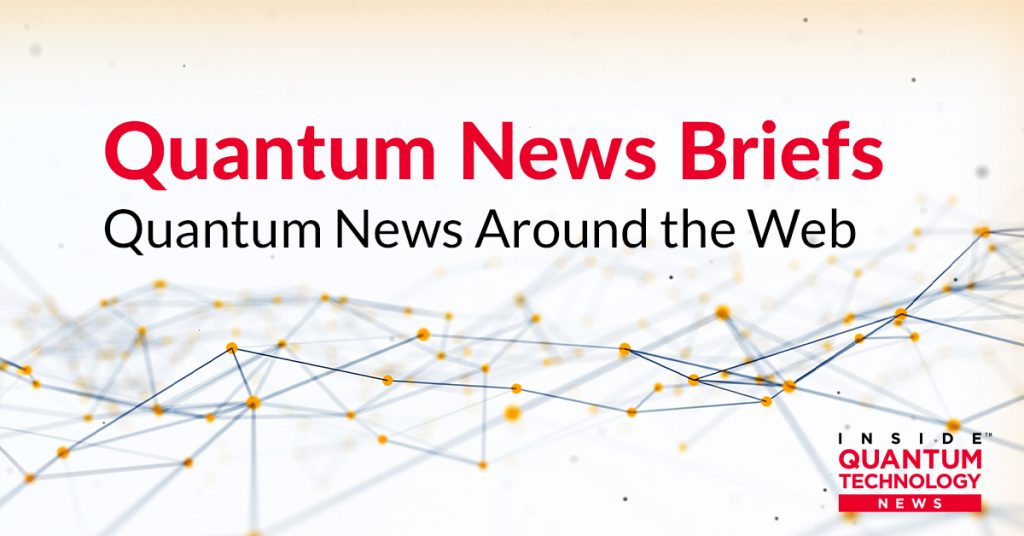Quantum News Briefs August 23 opens with: Six-Atom Quantum Computer Could Mimic the Human Brain followed by Microsoft Launches Azure Quantum for Educators. Next is the announcement that ColdQuanta has secured an Award from DARPA’s Embedded Entrepreneurship Initiative for its Commercial Quantum Clock and even MORE.
*****
A Six-Atom Quantum Computer Could Mimic the Human Brain
Bravo and his colleagues have succeeded in designing a quantum artificial neural network model that uses 6 rubidium atoms, which have a large diameter because some of their electrons orbit nuclei at a greater distance, to create a theoretical quantum computer that it can replicate the learning of various cognitive tasks typical of the human brain , such as multitasking, decision-making, and long-term memory.
Simulations carried out by the team on a quantum computer made of 6 rubidium atoms suggest that it could run a simple algorithm inspired by the human brain, capable of learning to remember and make simple decisions. Atoms could be effectively controlled by lasers, thus replicating the functioning of brain synapses.
*****
Microsoft Launches Azure Quantum for Educators
Azure Quantum for Educators features includes:
Practical and programming-oriented quantum computing curriculum for educators: A free, classroom-tested and continuously improving curriculum appropriate for students with and without a physics background. Includes syllabus, lecture slides, programming assignments, an automatic homework grading tool, samples of final projects, and more.
Free access to hands-on quantum hardware: The Azure Quantum Credits Program provides free access for quantum hardware exploration supporting teaching, learning, and deploying quantum programs on a diverse set of quantum computers.
Python and Q# code samples: Run these samples against Azure Quantum’s diverse and growing hardware portfolio of trapped ion, superconducting, and neutral atom quantum processing units (QPUs), or against a variety of hardware simulators and resource estimators.
Case studies and white papers: Learn about ways to introduce quantum computing to a variety of academic levels and settings, including undergraduate students.
Azure Quantum office hours: We’re here to help! Drop in to request direct support for and provide input on quantum education initiatives.
*****
ColdQuanta Secures Award from DARPA’s Embedded Entrepreneurship Initiative for its Commercial Quantum Clock
The goal of the EEI is to accelerate DARPA-funded transformational innovations to products for impact in the defense and commercial dual-use markets. DARPA’s EEI, teamed up with IQT Emerge, an effort within In-Q-Tel (IQT), supports the development of government-funded technologies to keep the national security community at the forefront of innovation.
“The significance of our collaboration with EEI is transformative and has a directional impact on the future of ColdQuanta as we further establish ourselves as a commercial leader in quantum technology,” said Scott Faris, ColdQuanta CEO. “We are in a period where global instabilities are accelerating the demand for highly accurate time reference units is high. ColdQuanta is pleased to have worked with a wide variety of US Government agencies for over a decade in building a robust portfolio of demonstrated capabilities in precision time. Now, we are honored to partner with organizations like DARPA and IQT Emerge to bring those capabilities to market and fill the growing demand.”
DARPA’s EEI program is one way DARPA promotes and accelerates the transition of the technology DARPA funds to benefit our warfighters and the public. “We look forward to supporting ColdQuanta in their pursuit to bridge the gap between their early-stage technologies and commercially viable products. We’re eager to watch as their portfolio of dual-use quantum technologies go to market,” said Simon Davidson, EVP at IQT Emerge.
*****
University of Waterloo Scientist Tapped to Lead Quantum-Safe Security for Canada
Public Safety Minister Marco Mendicino recently announced $675,000 in funding for the group that will help protect Canada’s networks from hackers using the next generation of supercomputers. Mendicino said, “In the 21st century, cybersecurity is national security.” And so Mendicino came to the heart of Quantum Valley to find the scientists who will help develop the keys for the quantum internet while keeping critical infrastructure safe.
Mosca’s timeline is long, but not that long: there is a three per cent chance practical quantum computers will be here in five years, that rises to a 30 per cent chance in 10 years, and it is more likely than not quantum computers will be a practical reality in 15 years. “It is an existential threat, I don’t mean to be dramatic but that’s what it is,” said Mosca.
Securing Canada’s networks from future quantum hacks will also spur new advances in technology. “All our networks are systemically vulnerable, so we need additional layers of defence,” said Mosca. “And that’s where new tools, quantum cryptography, will give us a level of resilience we have never had, but absolutely do need. The solutions will involve both software and hardware.
Mosca has a background in quantum information theory, quantum cryptography, astrophysics, math, physics and a dizzying array of appointments at UW and the Perimeter Institute for Theoretical Physics. Mosca came to UW in 1999 with a PhD in quantum computer algorithms from Oxford. At UW he founded a quantum cryptography group. Mosca was one of the first quantum computer scientists in the region when Mike Lazaridis recruited him.
Waterloo-based Quantum Valley Investments is at the centre of a growing cluster of quantum startups working in sensors, cryptography, materials, radar and quantum-nano fabrication.
*****
Sandra K. Helsel, Ph.D. has been researching and reporting on frontier technologies since 1990. She has her Ph.D. from the University of Arizona.
